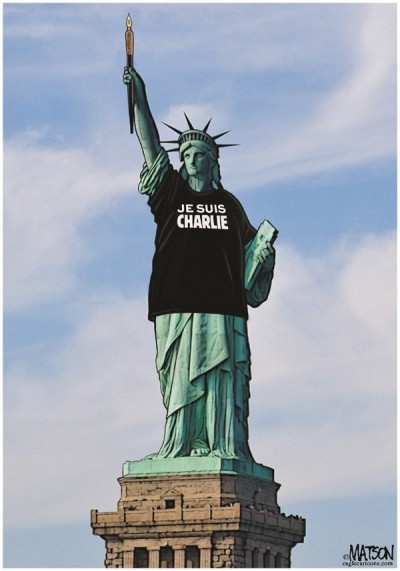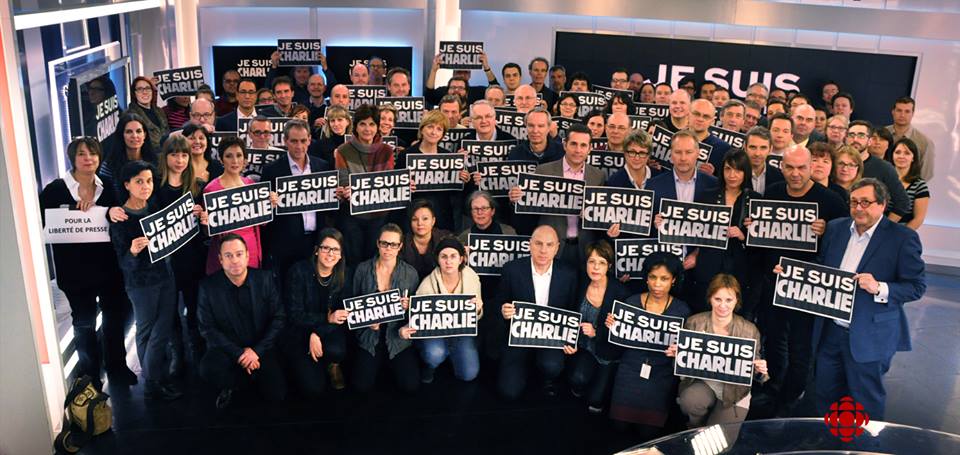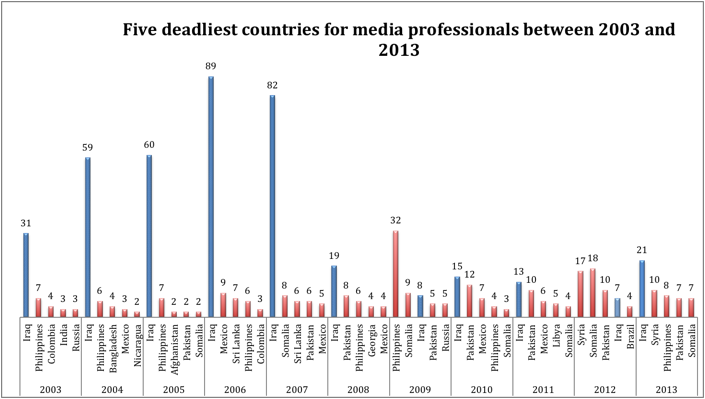Mourning Charlie Hebdo Journalists, While Ignoring that US-NATO State-Sponsored Terrorism is the “Number One Killer” of Journalists

In the wake of the terrorist attack by self-proclaimed Al-Qaeda operatives killing 12 people including 8 journalists from the French satirical newspaper Charlie Hebdo, the Western elite and mainstream media display of compassion and indignation highlights their complaisance towards Western and Israeli state terrorism.
Before exploring the broader issue, it should be noted that while the Paris attacks bear the hallmarks of a possible false flag, such as the ID card left in the car by one terrorist, an examination of the false flag hypothesis is excluded outright, completely ignored by the mainstream media. Moreover, one of the alleged terrorists, Cherif Kouachi told a French news outlet he had been financed by former Al Qaeda leader Anwar Al Awlaki, an American cleric who dined at the Pentagon a few months after 9/11 and «worked as a triple agent and an FBI asset well before 9/11», according to U.S. Lt.Col. Anthony Shaffer. (Kurt Nimmo, FBI Admits Pentagon Dinner Guest Al-Awlaki Worked for Them, Infowars, August 2, 2012)
Since the deadly attacks on January 7, 2015, the Western media, especially the French Canadian media, claim in a very ethnocentric manner that “the planet is mourning” the death of the French journalists. This tragic event which needs to be condemned must be examined in an appropriate context. People in countries where France has been bombing civilians, through NATO and U.S.-led military invasions, and where Western-backed terrorists kill innocent civilians (Libya, Syria) are routinely mourning the death of their own people. These deaths remain unreported. The Western world is not “the planet” and not “everyone is Charlie”, contrary to what the media leads us to believe.
Several newsrooms of the French Canadian public network Radio-Canada took pictures holding signs saying “I am Charlie”.
During the latest assault on Gaza, 17* Palestinian journalists were killed by the Israeli army. These journalists were killed to suppress the truth pertaining to Israeli atrocities. Western journalists holding signs of solidarity were nowhere to be found.
Before the James Foley and Steven Sotloff beheadings dozens of journalists were killed in Syria by terrorists armed, trained and financed by NATO countries and their antidemocratic allies such as Saudi Arabia. Hundreds of civilians had also been beheaded long before them, around 200 in one single village, according to a Human Rights Watch report. (See Julie Lévesque, The History of ISIS Beheadings: Part of the “Training Manual” of US Sponsored Syria “Pro-Democracy” Terrorists, Global Research, September 19, 2014)
The outrage and indignation, however, was reserved for the Western beheaded journalists. The war in Syria has been deadly for journalists, with 153 killed according to some estimates, thanks to NATO-sponsored terrorism. No Western journalist holding signs of compassion for Syrian journalists has been seen.
But the deadliest country in the world for journalists has been Iraq during the US occupation. According to the Committee to Protect Journalists (CPJ):
The U.S.-led war in Iraq claimed the lives of a record number of journalists and challenged some commonly held perceptions about the risks of covering conflict. Far more journalists, for example, were murdered in targeted killings in Iraq than died in combat-related circumstances…
At least 150 journalists and 54 media support workers were killed in Iraq from the U.S.-led invasion in March 2003 to the declared end of the war in December 2011, according to CPJ research.
Fatalities in Iraq far surpass any other documented war-time death toll for the press. CPJ, founded in 1981, recorded the deaths of 58 journalists during the Algerian civil war from 1993 through 1996, another 54 fatalities in the undeclared civil conflict in Colombia, which began in 1986; and 36 deaths in the conflict in the Balkans from 1991 to 1995….
Insurgent forces of one kind or another were responsible for the deaths of 110 journalists and 47 media workers. The actions of U.S. forces, including checkpoint shootings and airstrikes, were responsible for the deaths of 16 journalists and six media workers. (Frank Smyth, Iraq war and news media: A look inside the death toll, Committee to Protect Journalists, March 18 2013)
The BRussells tribunal numbers for Iraq are much higher:
In Iraq, at least 404 media professionals have been killed since the US invasion in 2003, among them 374 Iraqis, according to The BRussells Tribunal statistics. The impunity in Iraq is far worse than anywhere else in the world. (Dirk Adriaensens, The Killing of Journalists in Iraq, January 4, 2014)
Among the dead, two journalists – one Iraqi, Yasser Salihee, and one American, Steven Vincent – who had been investigating the US-backed death squads in Iraq.
On June 24, Yasser Salihee, an Iraqi special correspondent for the news agency Knight Ridder, was killed by a single bullet to the head as he approached a checkpoint that had been thrown up near his home in western Baghdad by US and Iraqi troops. It is believed that the shot was fired by an American sniper. According to eyewitnesses, no warning shots were fired.
The US military has announced it is conducting an investigation into Salihee’s killing. Knight Ridder has already declared, however, that “there’s no reason to think that the shooting had anything to do with his reporting work”. In fact, his last assignment gives reason to suspect that it was.
Over the past month, Salihee had been gathering evidence that US-backed Iraqi forces have been carrying out extra-judicial killings of alleged members and supporters of the anti-occupation resistance. His investigation followed a feature in the New York Times magazine in May, detailing how the US military had modeled the Iraqi interior ministry police commandos, known as the Wolf Brigade, on the death squads unleashed in the 1980s to crush the left-wing insurgency in El Salvador. (James Cogan, Journalist killed after investigating US-backed death squads in Iraq, World Socialist Web Site, July 1, 2005 )
American journalist Steven Vincent was kidnapped and murdered August 2 in Basra, the southern Iraqi city where he had been working as a freelance writer and blogger. Suspicion for this killing, the first of an American reporter in Iraq, focuses not on Al Qaeda or Sunni-based insurgents, but on the police of the Shiite-based administration installed in Basra with the support of US and British occupation forces.(Patrick Martin, US journalist who exposed Shiite death squads murdered in Basra, August 5, 2005)
For unknown reasons the Iraqi journalist Dr Yasser Salihee, was not included in the CPJ list.
The BRussels Tribunal further reports that numerous deaths go unreported by CPJ and Reporters without Borders. The explanation reflects the opposite of what is happening with the biased and emotional coverage of the Charlie Hebdo murders, namely downplaying the Iraqi journalists deaths.
It is a well-established fact that since the invasion of 2003 the corporate media have consistently downplayed mortality figures. The killing of media professionals is no exception. It’s obvious that the journalist advocacy groups in the West are reluctant to give the real casualty figures of their colleagues who lost their lives under the ruthless occupation of the US/UK, an occupation that is still ongoing. So they narrow their criteria of who should be included in their lists. This is an objectionable attitude, especially because it concerns professional colleagues….
Iraq was the deadliest country for media professionals in 2003, 2004, 2005, 2006, 2007, 2008, 2010, 2011 and 2013 (Adriaensens, op. cit.)
Almost 400 dead Iraqi journalists and yet our compassionate media professionals never held signs of solidarity.
*Originally it was written that 13 Palestinian journalists died during the latest assault on Gaza, but according to several news sources 17 deaths were reported. CPJ reported the death of 16 journalists and 4 media workers in “Israel and the Occupied Palestinian Territory”, as if it was one country altogether. Reporters Without Borders only listed 7 killings in Palestine.



